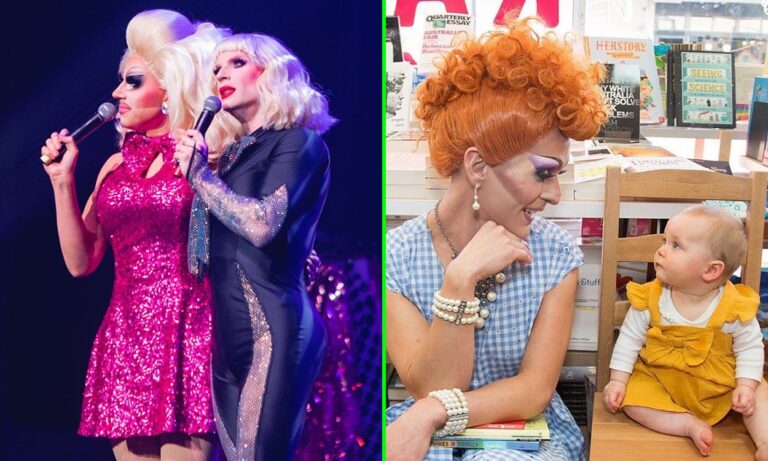Republicans in Tennessee propose new bill that would criminalise drag performances
The US Southern states are ramping up their recent crusade against drag performances. Lawmakers in Tennessee are proposing heavily anti-LGBTQIA+ legislation that will not only ban public drag performances but also restrict access to gender-affirming health care.
According to PinkNews, the proposed legislation was put forth by Tennessee Senate majority leader Jack Johnson and House majority leader William Lamberth, who were both successful in winning reelection during the recent midterms. Senate Bill 1 (SB1) seeks to criminalise gender-affirming health care for those under 18, while Senate Bill 3 (SB3) would ban public drag performances—on the off chance they might be seen by an underage child.
What SB3 actually represents is a serious overhaul of rights—most prominently, the rights of members of the LGBTQIA+ community who either perform in drag shows or seek them out as a way to find solace with other queer individuals. Any public performance deemed as ‘adult cabaret’ would be illegal and repeat offenders would be charged with a felony.
SB1, on the other hand, is a clear extension of the exhaustive anti-trans legislation that has begun to appear throughout the US. Under the new proposed bill in Tennessee, medical interventions or procedures altering a child’s hormones or affirming their gender would be illegal. If violated, the penalty against health care providers could amount to $25,000.
2021 was a record-breaking year in regard to anti-trans legislation across the country. Xtra, an LGBTQIA+-focused publication, reported that across the US, 37 states introduced 144 bills, and 18 of them became law.
What seems to be a recurrence in a number of anti-trans laws is the heavy presence of vague or unspecific language. This repeated lack of specificity allows lawmakers to have greater personal influence and sway over enforcement, and it makes challenging them far more difficult.
In a similar vein, the recent SB3 legislation follows a series of anti-drag proposals set forth by Republican officials over the summer of 2022. Most notably, in June, Texas lawmakers introduced legislation that bans minors from attending drag shows. NBC reported that Republican representative Bryan Slaton introduced a bill to ban minors from attending drag shows, as a way to ‘shield’ the children from what he described as “perverted adults.”
A number of Republican officials have persistently tried to condone drag shows as immoral, insisting that their goal is to sexualise children. These politicians—mostly men—have often been tag-teamed by far-right Christian groups who push similar rhetoric. For example, the Idaho Family Policy Center (IFPC) has told news outlets it plans to introduce a bill in January 2023 which will invoke a blanket ban on drag performances, which it has deemed as “vile sexual exhibitions.”
Of course, not only are these lawmakers misrepresenting drag in all of its forms, they’re also misunderstanding the purpose behind drag culture—which has been around since the 19th century.
Drag Queen Trixie Mattel, aka netizens’ favourite high-functioning makeup guru and comedy queen, explained the history of drag in a feature for Them and noted how drag was initially used by gay men to play with gender and express themselves in new ways. However, in the present day, it’s become an art form—still rooted in queer culture—where people can celebrate diversity, creativity and self-expression.
Another recent drag programme which has been under attack is Drag Queen Story Hour: a session where drag queen performers read children’s books to young audiences and their families. The books that are read sometimes also feature LGBTQIA+ characters. The events—usually hosted at public libraries and bookshops—are typically aimed at children aged between three and 11.
As reported by GAY TIMES, these story times have also been highly condemned by US lawmakers. Much of the criticism lies in a persistent trend among conservatives of linking homophobia to paedophilia.
However, a number of parents have come to the defence of the story hour, with one mother stating, “I feel it’s important for my little girl to meet lots of different people in life and have a really good understanding of diversity. There is no adult content in any performance, children love them because they are enthusiastic.”
In fact, what many people seem to forget is that there are a number of drag queens whose content is solely for children. Just as you would not take your child to an adult burlesque show or a very explicit comedy act, the same applies here. Drag is not binary, there is a spectrum of performers who cater to different audiences.
Matthew Cavan, who reads stories to children in Belfast as drag queen Cherri Ontop, spoke to The Guardian about the core reasons behind doing these events: “I have these children for an hour. I’m not going to try to tackle gender identity issues. My aim is just to give them little bits of information to try to make their world a bit brighter. I tell them that, growing up, I was considered very different, but now I get to wear what I want—and look at how fabulous I am! I let them know that being different is really cool, and so is being normal… And we can live in society together.”






